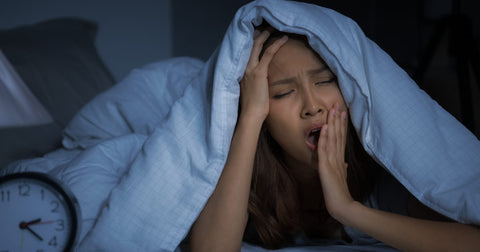Experiencing frequent bouts of diarrhea can be incredibly disruptive and concerning. While various factors can contribute to loose stools, anxiety often plays an overlooked role. If you're struggling with diarrhea, you might be surprised to learn that your emotional state could be a significant contributor.

This article delves into the intricate relationship between anxiety and diarrhea, exploring the scientific reasons behind this connection and offering practical solutions to help you regain control of your gut health.
Can Anxiety Cause Diarrhea? The Science Behind the Symptoms
Yes, anxiety can indeed trigger diarrhea. When you experience anxiety or stress, your body initiates a "fight-or-flight" response, releasing hormones like cortisol and adrenaline. These hormones prepare your body to deal with a perceived threat, but they can also wreak havoc on your digestive system.
Here's how anxiety can lead to diarrhea:
-
Increased Gut Motility: Stress hormones can accelerate the contractions that move food through your intestines, leading to loose stools and diarrhea.
-
Altered Fluid Secretion: Anxiety can also affect the balance of fluids in your gut, leading to increased water secretion and watery stools.
-
Gut Microbiome Disruption: Stress can disrupt the delicate balance of bacteria in your gut, further contributing to digestive issues and diarrhea.
Anxiety and Diarrhea: A Vicious Cycle

Anxiety can trigger diarrhea, and the experience of diarrhea itself can heighten anxiety, creating a vicious cycle. This highlights the importance of managing both anxiety and gut health for overall well-being.
What Does Anxiety Poop Look Like?
Anxiety-induced diarrhea typically presents as:
-
Loose and watery stools: The most common characteristic.
-
Increased frequency: You might experience more frequent bowel movements than usual.
-
Urgency: A sudden, overwhelming urge to use the bathroom.
Why Does Anxiety Make You Poop?
The stress hormones released during anxiety can directly affect your gut by:
-
Increasing gut motility: Speeding up the movement of food through your intestines.
-
Altering fluid secretion: Leading to looser stools.
-
Disrupting gut bacteria balance: Contributing to digestive upset.
Food Intolerance and Digestive Health
If you experience frequent diarrhea, even when stress is managed, consider the possibility of food intolerances or sensitivities. These can trigger inflammation and disrupt your gut health, contributing to diarrhea.
A food sensitivity test kit can help you identify specific foods that might be causing your symptoms. By eliminating or reducing these trigger foods, you can support a healthier gut and potentially alleviate your diarrhea.

Key Takeaways:
-
Anxiety and stress can indeed cause diarrhea by disrupting gut motility, increasing fluid secretion, and altering gut bacteria.
-
Managing stress through relaxation techniques, therapy, and a healthy lifestyle can improve gut health and reduce diarrhea.
-
If you experience persistent diarrhea, consider a food sensitivity test to identify potential food triggers.
Remember, this article is intended for informational purposes only and should not be considered a substitute for professional medical advice. If you have any concerns about your digestive health, consult a qualified healthcare professional.
Frequently Asked Questions:
1. I get diarrhea before important events or presentations. Is this normal?
Yes, this is a common example of how anxiety can affect your gut. Your body's stress response can trigger digestive changes, leading to diarrhea or other symptoms like nausea or stomach cramps.
2. How can I tell if my diarrhea is caused by anxiety or something else?
Pay attention to patterns in your bowel movements. If you notice that your diarrhea tends to occur during times of stress or worry, it could be anxiety-related. However, it's important to rule out other potential causes, such as food poisoning or infections, especially if your diarrhea is severe or accompanied by other symptoms.
3. What are some effective ways to manage anxiety-induced diarrhea?
Addressing the underlying anxiety is crucial. This might involve relaxation techniques like deep breathing, meditation, or yoga. If your anxiety is persistent or severe, consider seeking professional help from a therapist or counselor.
4. Can certain medications help with anxiety-related diarrhea?
In some cases, your doctor might recommend medications to help manage your anxiety or its associated digestive symptoms. These might include anti-anxiety medications or antidiarrheal drugs. It's essential to discuss your options with your doctor to determine the best approach for you.
5. I've tried managing my anxiety, but I still experience frequent diarrhea. Could a food intolerance be contributing to my symptoms?
Yes, food intolerances can worsen digestive issues, including diarrhea. If you suspect a food intolerance is playing a role, consider a food sensitivity test to identify potential triggers and make dietary adjustments.


.png?v=1737390083)
.png?v=1737187409)


